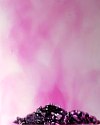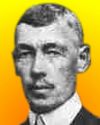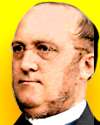 | TODAY IN SCIENCE HISTORY NEWSLETTER - 27 SEPTEMBER |
| Feature for Today |
 On 27 Sep 1838, Bernard Courtois died. Iodine became known as a new element from the serendipitous discovery he made. While routinely processing the ash from seaweed to recover sodium and potassium compounds, he released a curious violet vapour that condensed into attractive crystals.He had to leave to others the confirmation of his hunch that this was a new element. On 27 Sep 1838, Bernard Courtois died. Iodine became known as a new element from the serendipitous discovery he made. While routinely processing the ash from seaweed to recover sodium and potassium compounds, he released a curious violet vapour that condensed into attractive crystals.He had to leave to others the confirmation of his hunch that this was a new element.Thus seaweed, surely one of the most unlikely places to discover a new element, is recorded in the history of chemistry for yielding the substance that would in modern times be added to table salt as a health measure to prevent goitre. You can read more about Courtois and how he discovered iodine in this excerpt from The Discovery of the Elements (1934). |
| Book of the Day | |
| |
| Quotations for Today | |
 | "We have before us the restoration of that ancient land whose name was a synonym for abundance, prosperity, and grandeur for many generations. Records as old as those of Egypt and as well attested tell of fertile lands and teeming populations, mighty kings and warriors, sages and wise men, over periods of thousands of years. ... A land such as this is worth resuscitating. Once we have apprehended the true cause of its present desolate and abandoned condition, we are on our way to restoring it to its ancient fertility. A land which so readily responded to ancient science, and gave a return which sufficed for the maintenance of a Persian Court in all its splendor, will surely respond to the efforts of modern science and return manifold the money and talent spent on its regeneration." |
 | "Not long ago I expressed the view that the lack of general education and of thorough training in chemistry of quite a few professors of chemistry was one of the causes of the deterioration of chemical research in Germany. Will anyone to whom my worries seem exaggerated please read, if he can, a recent memoir by a Herr van’t Hoff on ‘The Arrangements of Atoms in Space’, a document crammed to the hilt with the outpourings of a childish fantasy. This Dr J H van’t Hoff, employed by the Veterinary College of Utrecht, has, so it seems, no taste for accurate chemical research. He finds it more convenient to mount his Pegasus (evidently taken from the stables of the Veterinary College) and to announce how, on his daring flight to Mount Parnassus, he saw the atoms arranged in space." (1877) |
 | "IODINE It was Courtois discover'd Iodine (In the commencement of this century), Which, with its sisters, bromine and chlorine, Enjoys a common parentage - the sea; Although sometimes 'tis found, with other things, In minerals and many saline springs. But yet the quantity is so minute In the great ocean, that a chemist might, With sensibilities the most acute, Have never brought this element to light, Had he not thought it were as well to try Where ocean's treasures concentrated lie. And Courtois found that several plants marine, Sponges, et cetera, exercise the art Of drawing from the sea its iodine In quantities sufficient to impart Its properties; and he devised a plan Of bringing it before us - clever man!" |
| QUIZ | |
| Before you look at today's web page, see if you can answer some of these questions about the events that happened on this day. Some of the names are very familiar. Others will likely stump you. Tickle your curiosity with these questions, then check your answers on today's web page. | |
| Births | |
 |  Robert Edwards, born 27 Sep, is a British medical researcher who, with Patrick Steptoe, perfected in-vitro fertilization of the human egg. Their technique made possible in the birth of Louise Brown, the world's first "test-tube baby." Robert Edwards, born 27 Sep, is a British medical researcher who, with Patrick Steptoe, perfected in-vitro fertilization of the human egg. Their technique made possible in the birth of Louise Brown, the world's first "test-tube baby."  In what decade did this birth occur? In what decade did this birth occur? |
 |  Hermann Kolbe, born 27 Sep 1818, was a German chemist who accomplished the first generally accepted synthesis of a certain kind, with a result that was strikingly different from prior work in chemistry. Hermann Kolbe, born 27 Sep 1818, was a German chemist who accomplished the first generally accepted synthesis of a certain kind, with a result that was strikingly different from prior work in chemistry.  What was his accomplishment? What was his accomplishment? |
| Deaths | |
 |  Auguste Michel-Levy , (1844 -1911) was a French geologist and mineralogist who was a pioneer in microscopic petrology. Auguste Michel-Levy , (1844 -1911) was a French geologist and mineralogist who was a pioneer in microscopic petrology.  What is petrology? What is petrology? |
| Events | |
 On 27 Sep of a certain year, scientists at the Naval Aircraft Radio Laboratory near Washington, D.C., demonstrated that if a ship passed through a radio wave being broadcast between two stations, that ship could be detected, the essentials of radar. On 27 Sep of a certain year, scientists at the Naval Aircraft Radio Laboratory near Washington, D.C., demonstrated that if a ship passed through a radio wave being broadcast between two stations, that ship could be detected, the essentials of radar.  In which decade did this occur? In which decade did this occur? | |
 In 1854, the first great disaster involving an Atlantic Ocean liner occurred when a steamship sank with 300 people aboard. In 1854, the first great disaster involving an Atlantic Ocean liner occurred when a steamship sank with 300 people aboard.  What was the name of this steamship? What was the name of this steamship? | |
| Answers |
When you have your answers ready to all the questions above, you'll find all the information to check them, and more, on the September 27 web page of Today in Science History. Or, try this link first for just the brief answers. Fast answers for the previous newsletter for September 26: the bombs skipped over the water surface to land against the dam wall; Levi Strauss; Yellow fever; Portland cement; U.S.A., (Oracle) Arizona, two years. |
| Feedback |
 If you enjoy this newsletter, the website, or wish to offer encouragement or ideas, please send feedback by using your mail reader Reply button. If you enjoy this newsletter, the website, or wish to offer encouragement or ideas, please send feedback by using your mail reader Reply button. |
--
If you do not want to receive any more newsletters, this link
To update your preferences and to unsubscribe visit this link
If you do not want to receive any more newsletters, this link
To update your preferences and to unsubscribe visit this link
! !



Δεν υπάρχουν σχόλια:
Δημοσίευση σχολίου